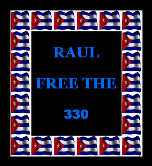
Reporters Without Borders has been in the forefront of highlighting the plight for a free and independent press in Cuba and in fighting for the release of jailed journalists.
Cuba, the last dictatorship in the Americas, is thus no longer the only country in the region to jail journalists but it remains the world’s second biggest prison for them, with 24 detained. President Fidel Castro’s handover of power to his brother Raúl on 31 July did not soften the regime’s attitude to dissident media and secret police hounding and summoning of journalists increased in the second half of the year.
Two journalists arrested in 2005 were freed but two others were imprisoned. They were Armando Betancourt, a freelance working with the Nueva Prensa Cubana agency in Camagüey held without trial by state security police since 23 May, and Raymundo Perdigón Brito, founder of the Yayabo Press news agency, who was given a four-year prison sentence on 5 December for “socially dangerous behaviour.” Guillermo Espinosa Rodríguez, of the Agencia de Prensa Libre Oriental (APLO), was put under house arrest for two years.
Cuba - Annual report 2007
President Fidel Castro’s stepping-aside in favour of his brother Raúl did not reduce pressure on the independent media and 24 journalists remain in prison. One of them, Guillermo Fariñas Hernández, staged several hunger strikes over seven months, calling for free Internet access for all Cubans. He was awarded the Reporters Without Borders Cyber-freedom Prize. Will defence minister and army commander Raúl Castro allow more basic freedoms ?
With less than 2 per cent of its population online, Cuba is one of the most backward Internet countries. An investigation carried out by Reporters Without Borders in October revealed that the Cuban government uses several levers to ensure that this medium is not used in a “counter-revolutionary” way. Firstly, it has more or less banned private Internet connections. To surf the Internet or check their e-mail, Cubans have to go to public access points such as Internet cafes, universities and “youth computer clubs” where their activity is more easily monitored. Secondly, the computers in all the Internet cafes and leading hotels contain software installed by the Cuban police that triggers an alert message whenever “subversive” key-words are spotted. The regime also ensures that there is no Internet access for dissidents and independent journalists, for whom communicating with people abroad is an ordeal. Finally, the government also relies on self-censorship. You can get 20 years in prison for writing “counter-revolutionary” articles for foreign websites. You can even get five years just for connecting to the Internet illegally. Few Internet users dare to run the risk of defying the regime’s censorship.
Guillermo Fariñas Hernández, head of the Cubanacán Press agency in Santa Clara, staged several hunger-strikes to support his demand for all Cubans to be allowed free access to the Internet. He was awarded the Reporters Without Borders - Fondation de France Cyber-freedom Prize on 12 December.
Full Report Here
I highlight the internet portion because I feel that once the internet barrier is broken, the truth will flood the island and have unprecedented results.
Don't forget:
As with every Friday , we join Cafe Cubano and our dissidents brothers and sisters in a fast to show solidarity and respect for their bravery.




No comments:
Post a Comment